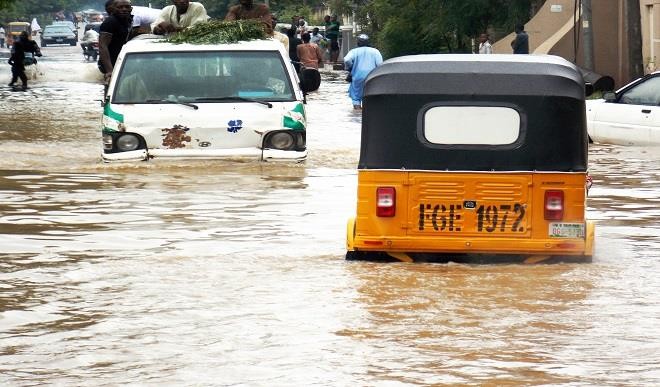Lagos flood: Curse of a neglected environment
In recent times, residents of Lagos State have witnessed torrential rainfall, which, in most parts, altered the way of life of the people largely due to heavy flooding, a recurring aftermath of such heavy downpours. Lagos, which is bordered by the Atlantic Ocean, has the indicators for the amount of flooding and other environmental harsh […]


In recent times, residents of Lagos State have witnessed torrential rainfall, which, in most parts, altered the way of life of the people largely due to heavy flooding, a recurring aftermath of such heavy downpours.
Lagos, which is bordered by the Atlantic Ocean, has the indicators for the amount of flooding and other environmental harsh conditions being experienced. This mainly costal region has one of the worrisome impacts of climate-change induced flooding in sub-Saharan Africa and indeed in the world.
For a reasonable number of years, the Lagos State government had invested in various efforts to preserve the environment recorded in the areas of education and series of actions geared towards environmental sustainability awareness, including proper waste management, a heavily-sustained tree planting exercise and an annual environmental conference which purpose was to highlight issues, discuss current researches and proffer solutions to burning environmental problems.
These activities are no longer top priority and clear reasons have not been advanced as to why renewed efforts have been halted. More so, the efforts to keep Lagos city clean, as was the case in previous years, seem to have been abandoned.
Today, most Lagos residents are concerned about the never-ending dumping of waste on major roads and around the inner cities, which in the event of the slightest rainfall, blocks the drainage systems causing serious hardship for residents. The services of the waste disposal agency seem inaccessible in most parts of the city and the potential danger of this development can only be left to the imagination.
To make matters worse, following a recent court ruling, the monthly environmental sanitation exercise was terminated. The impact of this legal action on the environment is yet to be fully contextualized, but will certainly lead to further degradation of the environment. Some had argued that the monthly sanitation exercise was an unnecessary action by the state government to restrict movement. But, put side by side the benefits to the wellbeing and health of the environment, this decision needs to be revisited.
It should be emphasized that to slow down the negative impact of climate change, the effort to reverse the burning of fossil fuel and reduce carbon emission must be sustained. All efforts, including political efforts and lobbying, must be focused on building alternative energy models, new and green production processes and working towards a cleaner planet through investment in clean energy and green production technologies. Industrialization should no longer be carbon based or carbon driven.
There is an urgent need for the Lagos State government to encourage researchers, who are interested, to investigate and proffer solutions to wide ranging causes and consequences, and to provide clear cut mitigation strategies to deal with environmental disasters as resulting from climate change.
Teaching of environmental sustainability in mostly secondary schools must be revisited as a way to galvanize the young and future policy makers into the broad consciousness of the need to preserve the environment. There used to be Climate Clubs in schools. These initiatives should equally be supported by corporate organizations in an effort to fulfill corporate citizenship responsibility to Lagos State.
Climate change is not just an environmental problem. It is a development problem that is directly linked to and responsible for multiple crises plaguing the world today.
